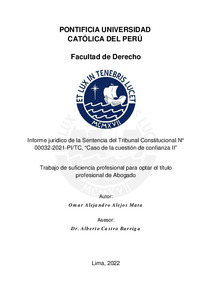Informe jurídico de la Sentencia del Tribunal Constitucional N° 00032-2021-PI/TC : Caso de la cuestión de confianza II
Abstract
El presente trabajo tiene por objetivo analizar la sentencia del Tribunal Constitucional peruano N° 00032-2021-PI/TC, “Caso de la cuestión de confianza II”, por el cual el Poder Ejecutivo interpone demanda de inconstitucionalidad contra la Ley N° 31355, Ley que desarrolla el ejercicio de la cuestión de confianza regulada en el último párrafo del artículo 132 y en el artículo 133 de la Constitución Política del Perú”, la cual fue aprobada por insistencia y promulgada por el Congreso de la República.
Tratándose de un proceso de inconstitucionalidad, se requerían cinco votos para declarar la demanda fundada y, consecuentemente, inconstitucional la ley impugnada. Sin embargo, este hecho no se produjo, pues cuatro magistrados emitieron votos singulares declarando infundada la demanda y sólo dos magistrados votaron a favor de declarar la inconstitucionalidad de la Ley N° 31355.
En ese sentido, en el presente trabajo se sostendrá que, contrariamente a lo decidido por el Tribunal Constitucional, la Ley N° 31355 es inconstitucional, tanto por la forma como por el fondo. Para ello, se seguirá la estructura propuesta por el exmagistrado Espinosa-Saldaña en su ponencia, incluyendo las consideraciones expuestas por los demás magistrados en sus votos singulares.
Así, en primer lugar, se realizará el examen de constitucionalidad formal de la Ley N° 31355. De un lado, se pondrá de manifiesto que el contenido material de la ley impugnada modifica el marco jurídico - constitucional actual, en virtud de lo cual su aprobación debió darse mediante ley de reforma constitucional y no a través de una ley ordinaria. De otro lado, se analizará el exceso del Congreso de la República en el ejercicio de sus competencias establecidas en el artículo 102.1 de la Constitución, respecto de su atribución para interpretar las leyes.
En segundo lugar, se realizará el examen de constitucionalidad sustantiva de la Ley N° 31355. Para ello se desarrollará un breve repaso sobre la naturaleza, objeto y alcances de la cuestión de confianza en el texto constitucional peruano. Acto seguido, se abordarán los límites que la Ley N° 31355 establece a la cuestión de confianza y cómo estos vulneran el principio constitucional de separación y equilibrio de poderes. Finalmente, se desarrollará la vulneración de las competencias del Tribunal Constitucional frente al desconocimiento de su doctrina jurisprudencial por parte del Congreso de la República. The objective of this paper is to analyze the sentence of the Peruvian Constitutional Court No. 00032-2021-PI/TC, "Case of the question of trust II", by which the Executive Branch files a claim of unconstitutionality against Law No. 31355, "Law that develops the exercise of the matter of trust regulated in the last paragraph of article 132 and in article 133 of the Political Constitution of Peru", which was approved by insistence and promulgated by the Congress of the Republic.
In the case of an unconstitutionality process, five votes were required to declare the claim founded and, consequently, the challenged law unconstitutional. However, this fact did not occur, since four magistrates issued separate votes declaring the lawsuit unfounded and only two magistrates voted in favor of declaring Law No. 31355 unconstitutional.
In this sense, in the present work it will be argued that contrary to what was decided by the Constitutional Court, Law No. 31355 is unconstitutional, both in form and substance. To do this, it will follow the structure proposed by Judge Espinosa-Saldaña in his presentation, including the considerations set forth by the other judges in their individual votes.
Thus, in the first place, the formal constitutionality examination of Law No. 31355 will be carried out. On the one hand, it will be shown that the material content of the contested law modifies the current legal-constitutional framework, by virtue of which its Approval should have been through a constitutional reform law and not through an ordinary law. On the other hand, the excess of the Congress of the Republic will be analyzed in the exercise of its powers established in article 102.1 of the Constitution, regarding its attribution to interpret the laws.
Second, an examination of the substantive constitutionality of Law No. 31355 will be carried out. For this, a brief review of the nature, object, and scope of the question of trust in the Peruvian constitutional text will be developed. Then, the limits that Law No. 31355 establishes to the question of trust will be addressed, and how these violate the constitutional principle of separation of powers, which includes the balance and balance of powers; and, finally, will be addressed the violation of the powers of the Constitutional Court against the lack of knowledge of its jurisprudential doctrine by the Congress of the Republic.
Temas
Derecho constitucional--Jurisprudencia--Perú
Inconstitucionalidad de la ley--Perú
Perú. Tribunal Constitucional
Inconstitucionalidad de la ley--Perú
Perú. Tribunal Constitucional
Para optar el título de
Abogado
Collections
The following license files are associated with this item:






